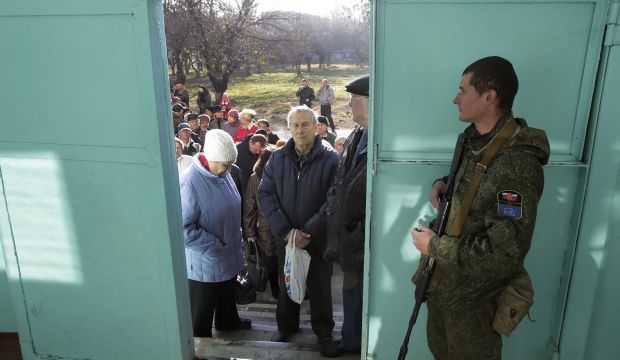
An armed man guards the entrance as local people stand in line outside a polling station during elections in the self-proclaimed Donetsk People’s Republic (DNR), in Donetsk, Ukraine, on November 2, 2014. (EPA/ANASTASIA VLASOVA)
The United States and European Union have denounced the vote as illegitimate, which is sure to stoke tensions further between the West and Russia.
The separatists’ election of a leader and People’s Council is the latest twist in a face-off between Russia and the West that started with Ukraine’s overthrow of a Moscow-backed president in February and the installation of a pro-European leadership.
In Donetsk, eastern Ukraine’s industrial capital and the separatists’ political and military stronghold, people lined up at polling stations. Soviet music blared out of speakers in front of a central voting station, where people sold bags of carrots, potatoes and cabbages for pennies.
“We are citizens of Donetsk, and we don’t want to live under the Kiev government that has turned its back on us,” said Sergei Kovalenko, 58, a private security guard who came to vote with his wife at a polling station set up at an elementary school.
“Our industry and factories gained their prestige in the Soviet Union. Now we are resurrecting them after years of neglect and the bombing that has destroyed so much here,” said his wife Lyudmila, 59, a teacher.
Some of the heaviest mortar and artillery shelling in the past few weeks could be heard in the predominantly Russian-speaking area just hours before voting was due to begin.
Kiev says the vote violates the Minsk protocol that underpins a ceasefire between the rebels and Ukrainian troops.
Although sporadically broken, the ceasefire has allowed a semblance of normality to return to Donetsk following violence that has killed more than 3,700 people in the region.
Kiev says the agreements, signed by rebel leaders and envoys from Kiev, Russia and the Organization for Security and Cooperation in Europe (OSCE), arrange for elections held under Ukrainian law that would appoint purely local officials.
But the rebels’ plan to elect leaders and institutions in a breakaway territory in the regions of Donetsk and neighboring Luhansk violates that agreement, Kiev says.
The vote is certain to further strain relations between the West and Russia after Russian Foreign Minister Sergei Lavrov said Moscow would recognize the vote.
On Friday, German Chancellor Angela Merkel told Russian President Vladimir Putin the election was illegitimate and would not be recognized by Europe.
Alexander Zakharchenko, the current rebel prime minister whose campaign advertisements are plastered across Donetsk, is almost certain to win the vote for the leadership of the self-proclaimed Donetsk People’s Republic.
Zakharchenko is a 38-year-old former mining electrician who uses earthy language in a heavy local accent. He has compared the region’s coal deposits to the oil reserves in the United Arab Emirates and has promised pensioners a stipend that will allow them to go on safari in Australia.
Wearing a dark suit rather than his usual military fatigues, Zakharchenko dropped his vote into a ballot box at a polling station at a local school.
“For justice, happiness, peace and prosperity,” he said. His opponents, two lesser known separatist figures, have rarely appeared in public.
“He doesn’t eat, he doesn’t sleep. He only works for us 150 percent of the time,” said Lyudmila Kovalenko, who works at a school. She said rebel leadership had fixed the windows of the school after it was hit by a mortar.
Rebels say the election will legitimize the separatist leadership and consolidate power, though many Donetsk residents say the vote will change nothing and that the outcome was a foregone conclusion.
Enthusiasm for the rebel cause, which was at its peak in Ukraine’s Russian-speaking east following the ouster of Moscow-backed Viktor Yanukovich, waned after violence closed banks and many stores, forcing people out of work.
A steady trickle of people came to vote on Sunday, in contrast to long lines of voters who participated in a referendum in May on independence from Ukraine.
“I don’t plan to vote. No one I know plans to either. There is no point,” said Natasha, a resident who did not want to give her last name who was interviewed outside a boarded-up jewellery store.
Some questioned the validity of an election with no voting lists that includes Internet voting and mobile polling stations.
“I don’t see why I should vote. It won’t change anything, and besides the election isn’t for the people of Donetsk. It’s for the rebels themselves,” said Vitaly, 34.

Trackbacks/Pingbacks